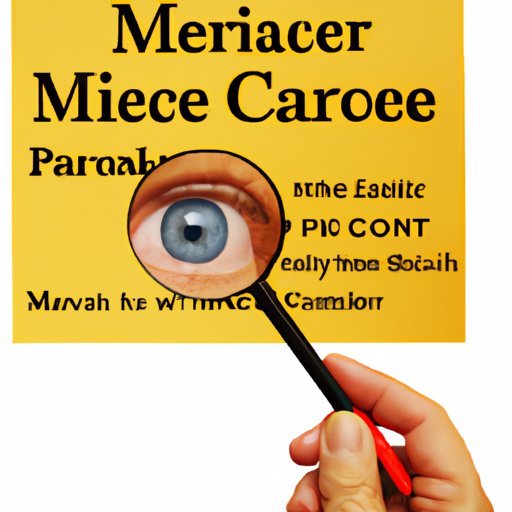Introduction
Cataracts occur when the lens in the eye becomes clouded, making it difficult to see clearly. Cataract surgery is a common procedure that can help improve vision. But does Medicare cover the cost of cataract surgery? In this article, we will explore the basics of Medicare coverage for cataract surgery, eligibility requirements, what costs are covered, financial options, benefits, and tips for choosing a provider.
Explaining the Basics of Medicare and Cataract Surgery
Medicare is a federal health insurance program that provides coverage for people over the age of 65 and certain disabled individuals. It is administered by the Centers for Medicare & Medicaid Services (CMS). Medicare is divided into four parts: Part A, Part B, Part C, and Part D. Part A covers hospital care and some home health services. Part B covers doctor’s visits, preventive care, and other medical services. Part C is an alternative to Original Medicare and is offered through private insurance companies. Part D covers prescription drugs.
Cataract surgery is a common procedure used to treat cataracts. During the surgery, the cloudy lens is removed and replaced with an artificial lens. The surgery is typically performed on an outpatient basis and takes about 30 minutes.
Examining Eligibility Requirements for Medicare Coverage of Cataract Surgery
In order to qualify for Medicare coverage of cataract surgery, you must meet certain eligibility requirements. To be eligible for Medicare, you must be 65 years or older, or you must be disabled and receiving Social Security Disability Insurance (SSDI) benefits. You may also be eligible if you have end-stage renal disease (ESRD) or amyotrophic lateral sclerosis (ALS).
If you meet the eligibility requirements, you must then enroll in Medicare. You can enroll in Original Medicare (Part A and Part B) during your Initial Enrollment Period, which begins three months before the month you turn 65 and ends three months after the month you turn 65. If you are already enrolled in Medicare, you can still add coverage for cataract surgery.

Analyzing What Costs are Covered by Medicare for Cataract Surgery
Once you are enrolled in Medicare, you may be eligible for coverage of cataract surgery. Medicare typically covers the cost of the surgery, including the doctor’s fees, anesthesia, and any necessary tests. However, you may be responsible for paying a deductible and co-payments. The amount you must pay depends on the type of plan you have. For example, if you have Original Medicare, you may be responsible for a 20% coinsurance after you meet your annual deductible.
In addition to the cost of the surgery, Medicare may also cover the cost of lenses and frames. The specific lenses and frames covered depend on the type of plan you have. For example, if you have Original Medicare, you may be eligible for basic single vision lenses. However, if you have a Medicare Advantage plan, you may be eligible for more comprehensive coverage, including bifocal and trifocal lenses.
Outlining Other Financial Options for Cataract Surgery
If you do not qualify for Medicare coverage, or if you need additional coverage, there are several other financial options available. Private insurance plans may cover all or part of the cost of cataract surgery. Some government programs, such as Medicaid and the Veterans Health Administration, may also provide coverage for cataract surgery. Additionally, there are patient assistance programs that may help reduce the cost of the surgery.

Discussing the Benefits of Cataract Surgery
Cataract surgery can help improve vision and reduce the risk of complications. After the surgery, most patients experience improved vision and fewer eye strain symptoms. The surgery can also reduce the risk of glaucoma, macular degeneration, and other eye diseases.

Providing Tips for Choosing a Provider for Cataract Surgery
When choosing a provider for cataract surgery, it’s important to research different providers and ask questions about their experience, training, and qualifications. Additionally, it’s important to consider the cost of the surgery and the quality of care. Make sure to compare different providers to find one that meets your needs.
Conclusion
Cataract surgery can help improve vision and reduce the risk of complications. Medicare may cover the cost of cataract surgery, but there are other financial options available as well. When choosing a provider for cataract surgery, it’s important to research different providers, ask questions, and consider the cost vs. quality of care.
(Note: Is this article not meeting your expectations? Do you have knowledge or insights to share? Unlock new opportunities and expand your reach by joining our authors team. Click Registration to join us and share your expertise with our readers.)
